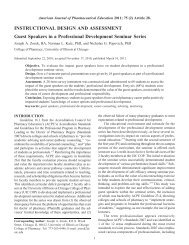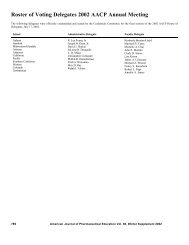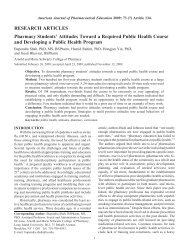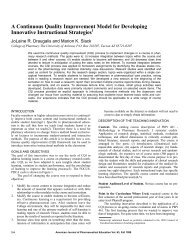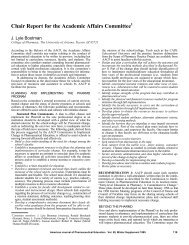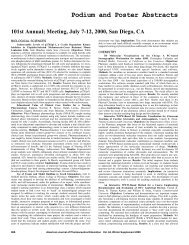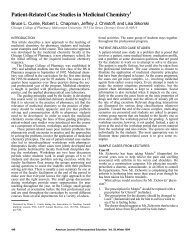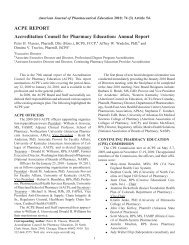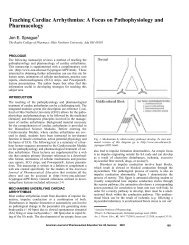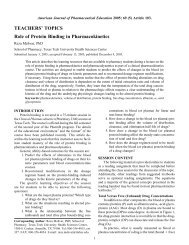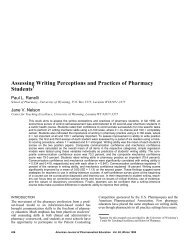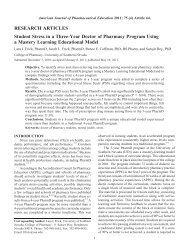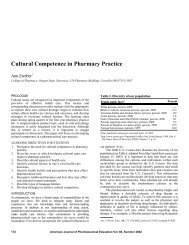Pharmacy Students' Perceptions of Pharmaceutical Care in ... - AJPE
Pharmacy Students' Perceptions of Pharmaceutical Care in ... - AJPE
Pharmacy Students' Perceptions of Pharmaceutical Care in ... - AJPE
Create successful ePaper yourself
Turn your PDF publications into a flip-book with our unique Google optimized e-Paper software.
American Journal <strong>of</strong> <strong>Pharmaceutical</strong> Education 2004; 68 (1) Article 4.<br />
3. Isetts BJ. Evaluation <strong>of</strong> pharmacy students’ abilities to provide<br />
pharmaceutical care. Am J Pharm Educ. 1999;63:11-20.<br />
4. Beardsley RS. Communication skills development <strong>in</strong> colleges <strong>of</strong><br />
pharmacy. Am J Pharm Educ. 2001;65:307-14.<br />
5. American College <strong>of</strong> Cl<strong>in</strong>ical <strong>Pharmacy</strong> Cl<strong>in</strong>ical Practice Affairs<br />
Subcommittee, MS Maddux (Chair) A vision <strong>of</strong> pharmacy’s future<br />
roles, responsibilities, and manpower needs <strong>in</strong> the United States.<br />
Pharmacotherapy. 2000;20:991-1022.<br />
6. Farris KB, Kirk<strong>in</strong>g DM. Predict<strong>in</strong>g community pharmacists’<br />
<strong>in</strong>tention to try to prevent and correct drug-therapy problems. J Soc<br />
Adm<strong>in</strong> Pharm. 1995;2:64-79.<br />
7. Chisholm MA, Wade WE. Us<strong>in</strong>g actual patients <strong>in</strong> the classroom<br />
to develop positive student attitudes toward pharmaceutical care. Am<br />
J Pharm Educ. 1999;63:296-9.<br />
8. Hekelman FP, Blase JR. Excellence <strong>in</strong> cl<strong>in</strong>ical teach<strong>in</strong>g: the core<br />
<strong>of</strong> the mission. Acad Med. 1996;71:738-42.<br />
9. Usat<strong>in</strong>e RP, Nguyen K, Randall J, Irby DM. Four exemplary<br />
preceptors’ strategies for efficient teach<strong>in</strong>g <strong>in</strong> managed care sett<strong>in</strong>gs.<br />
Acad Med. 1997;72:766-9.<br />
10. Green TG, Klausner LH. Cl<strong>in</strong>ic simulation and precl<strong>in</strong>ical<br />
performance. J Dent Educ. 1983;47:666-70.<br />
11. DeVilliers FPR. The use <strong>of</strong> content analysis <strong>in</strong> the assessment <strong>of</strong><br />
medical controversies. Medical Hypotheses. 1991;36:351-5.<br />
12. Dimitr<strong>of</strong>f A, Davis WK. Content analysis <strong>of</strong> research <strong>in</strong><br />
undergraduate medical education. Acad Med. 1996;71:60-7.<br />
13. Berelson B. Content Analysis <strong>in</strong> Communication Research. New<br />
York, NY: Free Press;1952.<br />
14. Budd RW, Thorp RK, Donohew L. Content Analysis <strong>of</strong><br />
Communications. New York, NY: MacMillan; 1967.<br />
15. Lambert BL. Directness and deference <strong>in</strong> pharmacy students’<br />
messages to physicians. Soc Sci Med. 1995;40:545-55.<br />
16. Carmichael JM, O’Connell MB, Dev<strong>in</strong>e B, Kelly HW,<br />
Ereshefsky L, L<strong>in</strong>n WD, Stimmel GL. Collaborative drug therapy<br />
management by pharmacists. Pharmacother. 1997;17:1050-61.<br />
17. Amsler MR, Murray MD, Tierney WM, Brewer N, Harris LE,<br />
Marrero DG, We<strong>in</strong>berger M. <strong>Pharmaceutical</strong> care <strong>in</strong> cha<strong>in</strong><br />
pharmacies: beliefs and attitudes <strong>of</strong> pharmacists and patients. J Am<br />
Pharm Assoc. 2001;41:850-5.<br />
18. Reid LD, Wang F, Young H, Awiphan R. Patients’ satisfaction<br />
and their perception <strong>of</strong> the pharmacist. J Am Pharm Assoc.<br />
1999;39:835-842.<br />
19. Brady D, Schultz L, Spell N, Branch WT. Iterative method for<br />
learn<strong>in</strong>g skills as an efficient outpatient teacher. Am J Med Sci.<br />
2002;323:124-9.<br />
20. Bowen JL, Carl<strong>in</strong>e J. Learn<strong>in</strong>g <strong>in</strong> the social context <strong>of</strong><br />
ambulatory care cl<strong>in</strong>ics. Acad Med. 1997;72:187-90.<br />
21. Fjort<strong>of</strong>t NF, Zgarrick DP. Develop<strong>in</strong>g the care <strong>in</strong> pharmaceutical<br />
care. Am J Pharm Educ. 2001;65:335-9.<br />
22. Farris KB, Kassam R, Cox CE, Volume CI, Cave A,<br />
Schopflocher DP, Tessier G. Evaluation <strong>of</strong> a practice enhancement<br />
program to implement pharmaceutical care. Am J Pharm Educ.<br />
1999;63:277-84.<br />
23. Curie JD, Chrischilles EA, Kuehl AK, Buser RA. Effect <strong>of</strong> a<br />
tra<strong>in</strong><strong>in</strong>g program on community pharmacists’ detection <strong>of</strong> and<br />
<strong>in</strong>tervention <strong>in</strong> drug-related problems. Am Pharm. 1997;NS37:182-<br />
91.<br />
24. Mehra IV, Wuller CA. Evaluation <strong>of</strong> a pilot cl<strong>in</strong>ical skills<br />
workshop series for community pharmacists. Am J Pharm Educ.<br />
1998;62:136-41.<br />
Appendix 1. Course Outl<strong>in</strong>e for Patient Counsel<strong>in</strong>g and<br />
Communication<br />
I. Introduction to Counsel<strong>in</strong>g and Communication<br />
A. Course Format<br />
B. Objectives<br />
C. <strong>Pharmaceutical</strong> <strong>Care</strong><br />
II. What is Communication?<br />
A. The Interpersonal Communication Model<br />
B. Term<strong>in</strong>ology Associated with Communication<br />
C. Interactive Patient Counsel<strong>in</strong>g Model<br />
III. Forms <strong>of</strong> Communication<br />
A. Perceptual Communication<br />
B. Nonverbal Communication<br />
C. Detect<strong>in</strong>g Nonverbal Cues <strong>in</strong> Others<br />
IV. Factors Affect<strong>in</strong>g Communication<br />
A. Literacy<br />
B. Psychogeometrics<br />
C. Transactional Analysis<br />
V. Listen<strong>in</strong>g and Empathy<br />
A. Styles <strong>of</strong> Listen<strong>in</strong>g<br />
B. Summariz<strong>in</strong>g and Paraphras<strong>in</strong>g<br />
C. Reflection <strong>of</strong> Feel<strong>in</strong>gs<br />
D. Facilitat<strong>in</strong>g<br />
VI. Conflict and Confrontation Skills<br />
A. Deal<strong>in</strong>g with the Angry Patient<br />
B. Assertiveness<br />
VII. The Patient Interview<br />
A. Counsel<strong>in</strong>g for Compliance<br />
B. Communicat<strong>in</strong>g with Special Patients<br />
C. Exercises <strong>in</strong> Patient Counsel<strong>in</strong>g<br />
6



